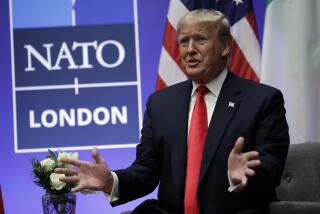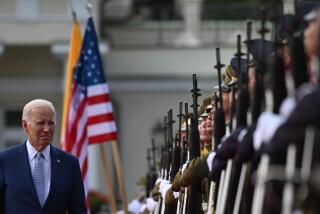New Germany Need Not Be in NATO, U.S. Says
WASHINGTON — The Bush Administration said Monday that a new, united German state would not have to be a member of the North Atlantic Treaty Organization but rather need only maintain “ties” to the alliance.
The shift in U.S. policy is the latest and most significant in a hectic series of revisions as Administration policy-makers run to keep up with the rapidly changing European situation. If it becomes reality, the new position on Germany would substantially reshape the Western alliance.
Currently, under the NATO treaty, West Germany is the location of the bulk of the alliance’s front-line troops. The West Germans themselves contribute a 340,000-member army to NATO’s forces.
Until now, U.S. policy toward German unification has been guided by four principles: self-determination, alliance with NATO, gradual change and reaffirmation of Germany’s eastern borders. Those principles were announced by Bush and Secretary of State James A. Baker III after Bush’s summit with Soviet President Mikhail S. Gorbachev in Malta. Now, said a senior White House official, “Forget about the four points. Events are just moving too fast.
“We’re starting to shift to face reality,” the official added.
The new reality is that the U.S. government, after resisting for years, now would be willing to accept German neutrality, at least in the sense of Germany no longer being part of a formal military alliance, so long as the Germans remain oriented toward the West in their political and economic system.
“We would prefer Germany to stay in the NATO alliance,” the official said, “but it’s going to have to be the decision of a united German government” after a new single state is formed. Should the new government choose to quit the formal alliance structure--an idea that has been advocated by some leading German politicians--the United States would accept a looser sort of link.
Neither government officials nor outside experts could say what exactly the Administration means by saying that Germany would be aligned with the alliance but not necessarily in it.
“Confusion reigns,” William J. Taylor of the Center for Strategic and International Studies here declared. With events moving so rapidly, he said, “anybody would be confused right now.”
The shift in U.S. policy trickled out to the public in an unusually convoluted manner Monday. At the daily White House briefing, spokesman Marlin Fitzwater was asked a question that called on him to restate what had been firm U.S. policy--that any future German state would have to remain in NATO.
Instead of the standard answer, Fitzwater demurred. The potential status of Germany, he said, is “under discussion.”
“If you want further definition,” he added, “there is none.”
At the State Department, spokeswoman Margaret Tutwiler was prepared with a similarly ambiguous statement to read in case reporters asked her about Germany’s future during the department’s daily press briefing. No one asked.
“We are pleased that the West German government has spoken about the importance of maintaining ties to NATO,” the statement said. “We agree that these ties should not involve a threat to the security in Europe but rather maintain security in Europe.”
The statement, officials said, was personally drafted by Baker after he met Friday with West German Foreign Minister Hans-Dietrich Genscher.
The Administration already accepts a form of neutrality for part of Germany. On Monday, the State Department, in a prepared statement, announced the United States now agrees that after reunification, NATO would not extend its area of operations east into what is now East Germany. Genscher had put forward that idea last week, but Baker had declined to comment directly on it after his meeting with the West German official Friday.
Genscher’s policy could effectively leave eastern Germany without foreign troops. Although the Administration has proposed that the United States and the Soviets be allowed to keep 195,000 troops each in Central Europe, officials and non-government experts consider it inevitable that the Soviets will choose to pull their troops out, instead.
With the Soviets likely to withdraw from Poland and Czechoslovakia, where demands for them to leave are continuing, any Soviet troops left in Germany would be so vulnerable as to be militarily useless, experts say.
How many troops the United States might leave in Europe continues to be a subject of considerable debate. The Administration on Monday reaffirmed its number of 195,000, but Congress and many former defense officials have suggested a far lower number would be adequate if the current trends in the Soviet Union continue.
In the past, any suggestion of German neutrality set off major alarm bells in Washington. Now, however, “the definition of what we mean by security is changing,” said Robert Hunter, who headed the National Security Council’s European division during the Carter Administration. “For the world that seems to be emerging, if you hadn’t invented NATO, you wouldn’t need it.”
Allied opinion may not be as sanguine. The British government, in particular, has been strenuous in insisting on continued NATO ties for Germany. On Monday night, a Foreign Office spokesman in London declined direct comment on the latest American position.
The European Community in December adopted a policy statement emphasizing that “existing treaties and commitments have to be honored,” the official noted. “Nothing anyone says anywhere else can change this feeling in Europe.”
Staff writers Norman Kempster, in Washington, and Tyler Marshall, in London, contributed to this story.
More to Read
Sign up for Essential California
The most important California stories and recommendations in your inbox every morning.
You may occasionally receive promotional content from the Los Angeles Times.











